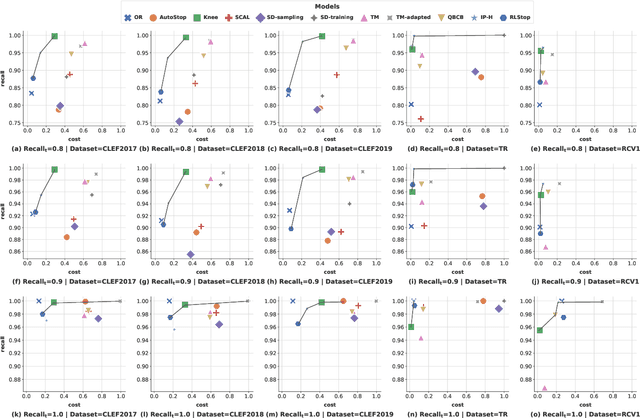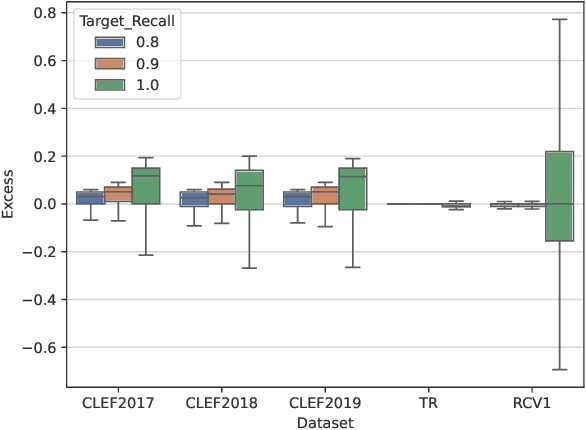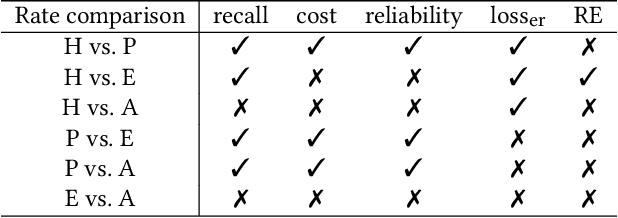Reem Bin-Hezam
A Generalised and Adaptable Reinforcement Learning Stopping Method
May 03, 2025Abstract:This paper presents a Technology Assisted Review (TAR) stopping approach based on Reinforcement Learning (RL). Previous such approaches offered limited control over stopping behaviour, such as fixing the target recall and tradeoff between preferring to maximise recall or cost. These limitations are overcome by introducing a novel RL environment, GRLStop, that allows a single model to be applied to multiple target recalls, balances the recall/cost tradeoff and integrates a classifier. Experiments were carried out on six benchmark datasets (CLEF e-Health datasets 2017-9, TREC Total Recall, TREC Legal and Reuters RCV1) at multiple target recall levels. Results showed that the proposed approach to be effective compared to multiple baselines in addition to offering greater flexibility.
RLStop: A Reinforcement Learning Stopping Method for TAR
May 03, 2024

Abstract:We present RLStop, a novel Technology Assisted Review (TAR) stopping rule based on reinforcement learning that helps minimise the number of documents that need to be manually reviewed within TAR applications. RLStop is trained on example rankings using a reward function to identify the optimal point to stop examining documents. Experiments at a range of target recall levels on multiple benchmark datasets (CLEF e-Health, TREC Total Recall, and Reuters RCV1) demonstrated that RLStop substantially reduces the workload required to screen a document collection for relevance. RLStop outperforms a wide range of alternative approaches, achieving performance close to the maximum possible for the task under some circumstances.
Combining Counting Processes and Classification Improves a Stopping Rule for Technology Assisted Review
Dec 05, 2023Abstract:Technology Assisted Review (TAR) stopping rules aim to reduce the cost of manually assessing documents for relevance by minimising the number of documents that need to be examined to ensure a desired level of recall. This paper extends an effective stopping rule using information derived from a text classifier that can be trained without the need for any additional annotation. Experiments on multiple data sets (CLEF e-Health, TREC Total Recall, TREC Legal and RCV1) showed that the proposed approach consistently improves performance and outperforms several alternative methods.
Stopping Methods for Technology Assisted Reviews based on Point Processes
Nov 14, 2023



Abstract:Technology Assisted Review (TAR), which aims to reduce the effort required to screen collections of documents for relevance, is used to develop systematic reviews of medical evidence and identify documents that must be disclosed in response to legal proceedings. Stopping methods are algorithms which determine when to stop screening documents during the TAR process, helping to ensure that workload is minimised while still achieving a high level of recall. This paper proposes a novel stopping method based on point processes, which are statistical models that can be used to represent the occurrence of random events. The approach uses rate functions to model the occurrence of relevant documents in the ranking and compares four candidates, including one that has not previously been used for this purpose (hyperbolic). Evaluation is carried out using standard datasets (CLEF e-Health, TREC Total Recall, TREC Legal), and this work is the first to explore stopping method robustness by reporting performance on a range of rankings of varying effectiveness. Results show that the proposed method achieves the desired level of recall without requiring an excessive number of documents to be examined in the majority of cases and also compares well against multiple alternative approaches.
 Add to Chrome
Add to Chrome Add to Firefox
Add to Firefox Add to Edge
Add to Edge